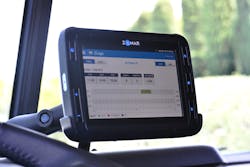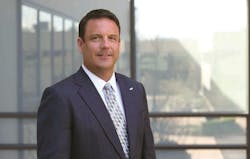While the marketing push around telematics systems and big data solutions has been aimed at large fleets—with the payback multiplied by the number of trucks—owner-operators and small fleets stand to benefit as well.
Following their presentation at a recent press event to outline the new partnership between Zonar Systems and Daimler Trucks North America, Zonar President and CEO Brett Brinton and Chief Strategy Officer Mike McQuade sat down with Fleet Owner to explain how the telematics tools they are developing make sense for even a single truck operator.
“A lot of telematics push has been about efficiency and uptime, without rewarding the driver. So we’re really aiming at things that make it better for the driver and the owner-operator,” says Brinton. “The benefit, if priced right, is it’s a dedicated, purpose-built device that would bring value to operating the truck, but would also add value when they turn the key off."
A near-term goal is to provide “affordable, tailored products” for different users, Brinton added.
“It’s more important, in my mind, to the guy out there trying to make a living in a truck that he owns than it is to a fleet—but they get the same value,” McQuade said.
The Zonar package has two components: the “black box,” which Brinton compares to a flight data recorder in aircraft and which transmits data to cloud storage and also has the capacity to talk to other devices; and a dedicated, versatile mobile tablet to access, process and display the data that’s collected in the cloud.
“What can an owner-operator do to monitor his truck, to collect data over time?” McQuade suggests, then he uses as an example running I-90 across Montana in March. A telematics platform stores the data from a previous trip, including environmental conditions, and compares apples-to-apples information to draw conclusions about the vehicle’s operation. “Things wear, things change. More sophisticated people will say, ‘I’m not going to guess anymore.’”
And that data can pay in a number of ways. The most obvious and substantial cost savings come from improved fuel efficiency. While some advantage is gained by making sure the engine is maintained for optimal performance, getting the best performance out of drivers is where the real money is.
“We’ve seen several examples of $1,000 a truck per month in fuel savings,” Brinton says, and a fleet customer that “watches MPGs like a hawk” still averages saving $400 a month per truck.
Zonar offers a program called Z Fuel, designed not only to measure fuel consumption, but to look at exactly how the truck was driven and then coach a driver to use fuel efficient techniques.
An Introduction to Zonar's Z Fuel from Zonar on Vimeo.
The Zonar team developed Z Fuel, but the partnership with Daimler—and the scope of data now available—will improve the tool from “very good” to “great,” McQuade adds.
And while the company executives are quick to note that most successful owner-operators know how to driver efficiently, there’s still a payoff.
McQuade’s pitch is simple: “I’ve got a couple of crisp $100 bills, and if you put 30 bucks in an envelope and send it to me, I’ll send these back to you.”
Then why aren’t owner-operators lined up at the Zonar door, what’s the pushback? Basically, Zonar hasn’t targeted them.
“We’re still a small business, with 300 people and just over $100 million in sales,” Brinton says. “We’ve just gone after fleets.”
In addition to fuel savings, the data can be used to fine tune maintenance cycles and reduce those costs. With an ELD mandate just around the regulatory corner, Zonar anticipates bundling a solution into their package as well.
“A lot of owner-operators have the attitude that ELDs have been shoved on them by the big fleets,” McQuade said. “I believe an ELD should be an app that just sits on any phone and talks to this platform on the truck. Why make a guy spend another 10 or 20 bucks a month? This is just in the cloud and secure. I think it’s our responsibility that Zonar make an ELD that’s as affordable as possible, and it will drive a lot of value for owner-operators.”
About the Author
Kevin Jones 1
Editor
Kevin has served as editor-in-chief of Trailer/Body Builders magazine since 2017—just the third editor in the magazine’s 60 years. He is also editorial director for Endeavor Business Media’s Commercial Vehicle group, which includes FleetOwner, Bulk Transporter, Refrigerated Transporter, American Trucker, and Fleet Maintenance magazines and websites.


